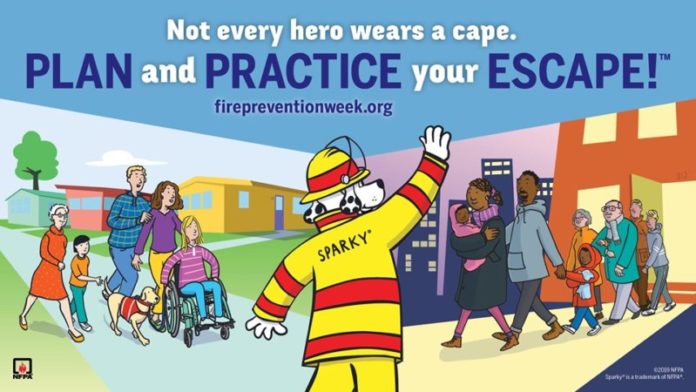
The Tennessee State Fire Marshal’s Office (SFMO) is raising awareness of the importance of home fire escape planning as part of consumers’ overall home fire safety plans during the upcoming National Fire Prevention Week (October 6-12). This year’s theme is “Not Every Hero Wears a Cape. Plan and Practice Your Escape!” which educates consumers about the small but important steps they can take every day to keep themselves and those around them safe.
“Tennessee has made great strides in reducing the state’s overall fire fatality rate through the efforts of our partners in the Tennessee fire service and their work with educating consumers,” said State Fire Marshal and Department of Tennessee Commerce & Insurance Commissioner Hodgen Mainda. “I urge my fellow Tennesseans to remember that home fires can strike anyone at any time. Escape planning, along with working smoke alarms and closing bedroom doors at night, could make a crucial difference that saves a life tomorrow. Be a hero and plan today!”
Sponsored by the National Fire Protection Agency since 1922, National Fire Prevention Week is observed each year during the week of October 9th to commemorate the Great Chicago Fire, which began on October 8, 1871, and caused devastation and fatalities. Fire departments and fire safety organizations use National Fire Prevention Week as a way to highlight fire safety in cities and communities across the nation.
As part of raising awareness about fire safety, the SFMO asks consumers to remember:
Home Fire Escape Planning
Home fire escape planning and drills are an essential part of fire safety. A home fire escape plan needs to be developed and practiced before a fire strikes. Home fire escape planning should include the following:
· Drawing a map of each level of the home, showing all doors and windows.
· Going to each room and pointing to the two ways out.
· Making sure someone will help children, older adults, and people with disabilities wake up and get out.
· Teaching children how to escape on their own in case you cannot help them
· Establishing a meeting place outside and away from the home where everyone can meet after exiting.
Use Working Smoke Alarms
· Smoke alarms should be installed inside every sleeping area, outside every sleeping area, and on every level of the home. Ensure everyone can hear the alarms and know what they sound like.
· For best protection, equip your home with a combination of ionization and photoelectric smoke alarms. Look for alarms that can be interconnected—this means when one alarm sounds, they will all sound.
· Smoke alarms with non-replaceable, long-life batteries are available and are designed to remain effective for up to 10 years. This means that if the alarm chirps, it’s time to replace the entire unit.
· For smoke alarms with traditional removable batteries, replace the batteries twice a year.
· If you need working smoke alarms, contact your local fire department today and ask if they participate in our “Get Alarmed, Tennessee!” program.
Close Bedroom Doors At Night
· A closed door can hinder flames and smoke from spreading to other rooms and can help deprive a fire of the oxygen it needs to grow, limiting the structural damage a fire can cause and, most importantly, saving lives.
· Closing the door can stop the spread of fire in a home allowing time to find alternate escape routes if your main route is blocked.
· Close the bedroom door when sleeping, if possible. Remember to have smoke alarms inside and outside of each sleeping area. For the best protection, make sure your alarms are interconnected—when one sounds, they all will sound.
· Close the door behind you when escaping a room or building that is on fire.
· If you are unable to escape a building that is on fire, close all doors between you and the fire. Use towels or sheets to seal the door cracks and cover air vents. Call the fire department and report your exact location.
Additional tips for keeping your family safe from the dangers of fire can be found at tn.gov/fire.
















